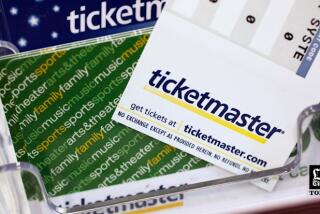Ticketmaster Deal: New Avenues for Diller
Barry Dillerâs acquisition of a controlling interest in Ticketmaster Group Inc. is part of the media mogulâs attempt to plant his Home Shopping Networkâs flag squarely in the emerging field of electronic commerce.
In one of the first concrete signs of how Diller will expand the television merchandising business he acquired in 1995, HSN Inc., Home Shoppingâs parent company, said Tuesday it would acquire a 47.5% stake in Ticketmaster from Microsoft Corp. co-founder Paul Allen in a stock swap worth about $209 million. HSN will acquire additional shares of Ticketmaster on the open market to give it a controlling stake.
While Ticketmaster dominates phone ticket sales, selling two-thirds of the 10 million seats sold annually in stadiums and theaters, Home Shopping Network hawks merchandise over television, filling more than 24 million orders for jewelry and other products every year.
But neither company makes full use of capabilities in telemarketing and order fulfillment. Rather than cut costs by combining the two companiesâ operations, Diller plans to contract out their services to third parties as catalog, Internet and phone sales expand electronic retailing.
âWe have a shared vision of how our expertise in transactional processing can be put to use,â Diller, chief executive of HSN Inc., said in an interview Tuesday.
The transaction was widely praised on Wall Street, where stocks of both companies jumped dramatically. While the stock price of an acquiring company generally falls because of the dilutive effect of issuing more shares or taking on more debt, HSN shares rose $3.25 to a 52-week high of $30 on Nasdaq. Ticketmasterâs stock, which has mostly languished since its public offering in 1996, increased $1.75 a share to $14.50 on Nasdaq.
Diller said the Ticketmaster purchase helps clarify HSNâs strategy on Wall Street. Wall Street sources expect HSN to make additional acquisitions in this arena, perhaps by acquiring a large catalog merchandiser.
Under the transaction, HSN will give Allen about 7.2 million shares of Home Shopping Network in exchange for his 12.3 million shares of Ticketmaster. The deal will give Allen an 11% stake in HSN and a seat on its board.
HSN said the companies would continue to operate as independent entities, with Allen and other Ticketmaster executives joining Home Shopping Networkâs board.
âThis is a win-win,â said Mario Gabelli, whose Gabelli mutual funds are invested in both companies. âIt brings visibility to Diller, whose stock is undervalued, and brings him an affiliation with Paul Allen, a rich billionaire who knows Microsoft.â
Diller said he approached Allen about three months ago about merging Ticketmaster into HSN--long before Ticketmaster sued Microsoft, alleging that the Redmond, Wash.-based software giantâs Web site, Sidewalk, was linking to Ticketmaster without its permission. Some press reports Monday speculated that Allenâs sale was motivated in part by the Ticketmaster suit.
But sources close to Allen say he had grown frustrated with Ticketmasterâs slow entry into the online ticket business and saw a greater potential by combining with HSN. Since it began marketing online six months ago, Ticketmaster has sold as many as 3 million tickets a month on the Internet.
Ticketmaster Chief Executive Fred Rosen has also run into obstacles in expanding his beyond his core ticket business because of customersâ reluctance to buy such things as T-shirts and tapes by phone, sight unseen. The ability to cross-promote on the Home Shopping Network, or on a channel of its own, is enticing to Ticketmaster.
In addition to the home shopping cable channel, HSN owns a group of television stations, each of which will be able to eventually offer households several channels because of new digital licenses issued by the government.
Diller has done an impressive job of turning around HSN with better management and a better mix of merchandise and has positioned it to push more aggressively into online sales, through the Internet Shopping Network. âAs all forms of electronic commerce grow, the need for efficient transactional capability will exponentially grow,â Diller said. âAnd we intend to be an aggressive player in offering these services to the thousands of companies that will need them as they develop their own versions of interactive direct commerce.â
(BEGIN TEXT OF INFOBOX / INFOGRAPHIC)
Bouncing Back
Ticketmasterâs stock price has mostly languished since the company went public in November. It rebounded this past week. Weekly closes, except latest:
Tuesday: $14.50, +$1.75
Source: Bloomberg News
More to Read
Inside the business of entertainment
The Wide Shot brings you news, analysis and insights on everything from streaming wars to production â and what it all means for the future.
You may occasionally receive promotional content from the Los Angeles Times.










